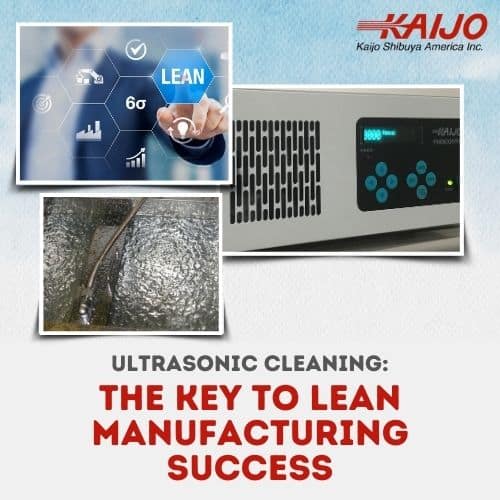Ultrasonic Cleaning: The Key to Lean Manufacturing Success
October 2, 2024

Lean Manufacturing has become a cornerstone of modern industrial processes, focusing on reducing waste, increasing operational efficiency, and continuously improving production workflows. Over the past 15 years, more manufacturers have embraced Lean principles to remain competitive in an evolving market. However, implementing these principles requires the right technology to minimize inefficiencies and streamline operations.
Ultrasonic cleaning technology has emerged as a key enabler in supporting Lean Manufacturing. Using ultrasonic cleaning aligns with Lean goals by reducing the need for harsh chemicals, cutting water usage, and minimizing manual labor. The advanced cleaning capabilities of this technology help manufacturers reduce waste, enhance efficiency, and maintain consistent product quality across different production cycles. This ensures that businesses can achieve operational excellence and sustainability, positioning ultrasonic cleaning as an essential tool in modern manufacturing environments.
Ultrasonic cleaning supports the waste reduction goals of Lean Manufacturing and improves product quality, making it a critical component in helping manufacturers stay competitive.
Understanding Lean Manufacturing Principles
Lean Manufacturing is centered around three core principles: reducing waste, continuous improvement, and operational efficiency. Manufacturers can drive efficiency while maintaining high product quality by streamlining production processes, minimizing unnecessary steps, and optimizing resource use. Waste reduction in Lean encompasses various types of waste, including excessive inventory, overproduction, defects, and inefficient processes that lead to downtime.
For many manufacturers, achieving these goals while managing complex production lines, meeting customer demands, and maintaining stringent quality standards is one of the biggest challenges. Common issues include inconsistent product quality, excessive time spent on manual processes like cleaning, and operational inefficiencies contributing to unnecessary costs and delays.
To overcome these obstacles, advanced technologies like ultrasonic cleaning are essential. They align perfectly with Lean principles by automating cleaning processes, reducing downtime, and cutting costs related to labor, chemicals, and water. By improving cleaning efficiency and ensuring that equipment and parts are always in optimal condition, ultrasonic cleaning contributes significantly to operational excellence, making it a vital tool for manufacturers looking to implement or enhance their Lean strategies.
The Role of Ultrasonic Cleaning in Lean Manufacturing
Ultrasonic cleaning technology is a powerful tool that helps manufacturers achieve Lean Manufacturing objectives by directly addressing waste reduction, efficiency, and product quality. The technology uses high-frequency sound waves to create microscopic bubbles in a cleaning solution, which implode to remove contaminants from surfaces and parts, ensuring thorough and consistent cleaning. Here’s how ultrasonic cleaning technology aligns with Lean principles:
- Reduction of Waste:
Ultrasonic cleaning reduces the need for harsh chemicals and minimizes water consumption, directly supporting Lean’s waste-reduction goals. By eliminating the reliance on toxic cleaning agents and excessive water, manufacturers can cut down on hazardous waste and lower environmental impact. - Increased Production Uptime:
Lean Manufacturing emphasizes minimizing downtime and optimizing efficiency. Ultrasonic cleaning accelerates the cleaning process, requiring significantly less manual labor and maintenance. This enables manufacturers to keep equipment running longer without unnecessary interruptions, leading to increased production uptime. - Enhanced Product Quality:
Consistently cleaned parts are essential for maintaining high product quality, a key objective of Lean Manufacturing. Ultrasonic cleaning ensures thorough and precise cleaning, removing even the smallest contaminants that could cause defects. This reduces the likelihood of errors and enhances overall product quality and consistency across production batches.
By integrating ultrasonic cleaning technology into their operations, manufacturers can significantly improve waste reduction, production efficiency, and product quality—all core elements of Lean Manufacturing.
Benefits of Ultrasonic Cleaning for Manufacturers
Manufacturers implementing Lean Manufacturing principles benefit significantly from incorporating ultrasonic cleaning systems into their processes. The technology offers multiple advantages that align with Lean goals and provide long-term operational and financial benefits. Here are the key benefits of ultrasonic cleaning for manufacturers:
- Reduction of Waste:
Ultrasonic cleaning eliminates the need for harsh chemicals and significantly reduces water usage. This reduction in consumables helps manufacturers lower their environmental footprint and aligns with Lean’s core principle of minimizing waste. Additionally, it reduces the handling and disposal costs associated with toxic chemicals, contributing to cleaner and more sustainable operations. - Efficiency Gains:
Ultrasonic cleaning systems offer faster, automated cleaning cycles compared to traditional methods, which often rely on manual labor and take longer to achieve the same results. Manufacturers can reduce downtime, improve throughput, and increase production efficiency by automating the cleaning process. This aligns with Lean’s focus on continuous improvement and optimizing workflows to maximize productivity. - Improved Quality Control:
Clean components are critical for product quality, especially in industries where contamination can lead to defects or operational failures. Ultrasonic cleaning ensures a high level of consistency and thoroughness, removing contaminants even from intricate parts. This helps manufacturers meet stringent quality control standards, reducing the risk of defects and rework while enhancing product reliability. - Cost Savings:
By reducing the need for manual cleaning, water, and chemicals, ultrasonic cleaning systems help manufacturers lower their operating costs. The efficiency gains also contribute to cost reductions by minimizing downtime and maximizing production time. These savings can be reinvested into other areas of the business, further driving Lean initiatives.
Incorporating ultrasonic cleaning technology into manufacturing processes provides measurable benefits that support Lean Manufacturing goals. Manufacturers can expect lower waste, improved efficiency, enhanced product quality, and significant cost savings, making ultrasonic cleaning a valuable investment for companies focused on operational excellence and sustainability.
How Kaijo’s Advanced Ultrasonic Cleaning Systems Support Lean Manufacturing
Kaijo’s ultrasonic cleaning systems are designed to help manufacturers easily integrate Lean Manufacturing principles into their operations. By offering advanced cleaning solutions, Kaijo ensures that manufacturers can achieve higher efficiency, reduced waste, and improved product quality. Here’s how Kaijo’s ultrasonic cleaning systems provide tangible support for Lean initiatives:
- Increased Production Efficiency:
Kaijo’s ultrasonic cleaning systems automate the cleaning process, drastically reducing manual labor and decreasing cleaning cycle times. This allows manufacturers to clean parts and equipment faster and more effectively, resulting in less downtime and more operational uptime. With Kaijo’s systems, companies can streamline their workflows and achieve significant gains in production efficiency. - Reduction of Operational Costs:
Kaijo’s ultrasonic cleaning systems are designed to minimize the use of energy, water, and chemicals, which translates into lower operational costs for manufacturers. These systems operate with less water and eliminate the need for harsh chemical agents, reducing material costs and handling expenses. By improving energy efficiency, Kaijo helps manufacturers cut down on utility costs, aligning perfectly with the cost-reduction goals of Lean Manufacturing. - Minimized Downtime:
Equipment maintenance and cleaning are major contributors to downtime in manufacturing processes. Kaijo’s ultrasonic cleaning systems are highly reliable and can thoroughly clean parts without frequent manual intervention. This minimizes the time spent on equipment maintenance, reducing downtime and enabling longer continuous production runs. Manufacturers can keep their operations running smoothly without unnecessary interruptions. - Enhanced Product Quality:
Kaijo’s advanced ultrasonic technology ensures that parts are cleaned with precision, meeting stringent quality control standards. Consistently clean parts result in fewer defects, higher product quality, and improved customer satisfaction. By helping manufacturers maintain a higher quality standard, Kaijo’s systems contribute to reduced rework and waste, reinforcing the Lean Manufacturing focus on quality and efficiency.
Kaijo’s ultrasonic cleaning systems are engineered to support Lean Manufacturing by enhancing production efficiency, reducing costs, minimizing downtime, and improving product quality. These features make Kaijo an ideal partner for manufacturers seeking to optimize their operations and maintain a competitive edge in today’s industrial landscape.
Key Takeaways for Manufacturing Engineers
For manufacturing engineers seeking to implement or enhance Lean Manufacturing strategies, ultrasonic cleaning technology is a powerful tool that can drive significant improvements in efficiency, waste reduction, and product quality. By automating and optimizing the cleaning process, ultrasonic systems directly support Lean principles, enabling manufacturers to streamline operations and meet the demands of modern production environments.
Key takeaways for manufacturing engineers include:
- Ultrasonic Cleaning Drives Lean Efficiency:
By reducing manual cleaning and minimizing downtime, ultrasonic cleaning systems enhance operational efficiency, allowing for faster production cycles and continuous improvement in line with Lean Manufacturing principles. - Waste Reduction Through Advanced Technology:
Ultrasonic cleaning systems significantly reduce water, chemicals, and energy use, supporting the Lean goal of waste reduction while also contributing to a more sustainable manufacturing process. - Improved Product Quality:
Consistently cleaned parts and equipment lead to fewer defects and higher quality products, which are essential for maintaining competitiveness in today’s market. Ultrasonic cleaning ensures precise, thorough cleaning for even the most complex components, helping engineers meet strict quality standards. - Cost Savings and Sustainability:
Kaijo’s ultrasonic cleaning systems offer long-term cost savings through reduced material consumption, lower operational costs, and fewer resources dedicated to cleaning and maintenance. These savings can be reinvested into further Lean initiatives and sustainability efforts.
For manufacturing engineers focused on optimizing processes and maintaining a competitive edge, ultrasonic cleaning is a strategic decision that delivers measurable benefits in line with Lean Manufacturing goals.
Conclusion
In today’s manufacturing environment, adopting Lean Manufacturing principles is essential for maintaining operational efficiency, reducing waste, and ensuring consistent product quality. Advanced technologies, such as ultrasonic cleaning technology, are critical in helping manufacturers achieve these goals. By automating cleaning processes, reducing resource consumption, and improving overall product quality, ultrasonic cleaning aligns perfectly with Lean principles.
Kaijo, a leader among ultrasonic cleaner manufacturers, provides advanced ultrasonic cleaning systems that equip manufacturing engineers with the tools to enhance production efficiency, minimize downtime, and reduce operational costs. These systems meet the rigorous demands of modern manufacturing and contribute to sustainable practices by reducing water, energy, and chemical usage. For manufacturers committed to operational excellence and sustainability, Kaijo’s solutions are an invaluable asset in the pursuit of Lean Manufacturing success.
If you’re ready to optimize your cleaning processes and achieve Lean Manufacturing goals, explore Kaijo’s ultrasonic cleaning systems today. Contact Kaijo for a free consultation to see how their solutions can drive your manufacturing success.





